The Language of "Gender Parity"
19 Women Playwrights and Their Voices
The English language is a thrilling, complex entity. It’s constantly growing and updating itself as words, phrases, and expressions trickle into popular culture, into conversations, and finally—this part is the strangest for me—into how we process thought and emotion. Language defines our reality. I may experience a certain desire or frustration, but until I have a word for it—a word that others will recognize and accept as valid—I cannot express that feeling truly and completely.
Like many adolescents, in high school I was searching for higher meaning. Theatre was my personal pathway into a more vibrant, colorful world. However, there were times when a play just didn’t do it for me. The words remained distant, the world rigid, and I felt alienated from the characters onstage: the women who were depicted as one-dimensional caricatures and only included in a scene for comedic support. The women whose only prize at the end of a play was to fall in love, but only if she changed “for the better.” The men who talked of women as conquests and pawns in their ulterior schemes. For quite a while, I assumed that was just how plays were. But by the end of high school and the beginning of college, I started learning new names: Anna Deavere Smith, Caryl Churchill, Sarah Ruhl, Paula Vogel, Suzan-Lori Parks, Annie Baker… I was enchanted by their words, their poetry, their characters’ pain, but also their characters’ triumphs.
The first time I read Lynn Nottage’s Ruined, my body went into involuntary shock. I was astonished by the precision of her language and how it so perfectly captured the horrors of women’s experiences with violence and sexual assault during the Congo civil war. In one of the final scenes of the play, the character Salima delivers her last words to a room full of men soldiers before she dies, “You will not fight your battles on my body anymore.” Tears clustered in my eyes as I realized just how much I needed to read those words. A woman’s body became an image of the battlefield, one where political conflict violates the personal and personal conflict becomes the political. I often think of these words when I feel unsafe as a woman, comforted to know that my own feelings of vulnerability are valid. Ms. Nottage did that for me.
The interview question, ‘Do you think women writers tell different stories than men writers?’ forces us to think of gender in a very rigid dichotomy of men and women as polar opposites, not acknowledging that a writer may identify in the middle of the gender spectrum. …What could our reports look like if we were more inclusive of all of gender identities?
In my sophomore year in college, I heard the term “gender parity” for the first time. My world started spinning at a new frequency, as I began to fling, often canonical, plays out of my atmosphere while welcoming more inclusive works of theatre into my extended arms. I was entering into a new galaxy of inquiry and optimism.
The summer of 2014, I was funded by The Andrew W. Mellon Foundation to conduct my own qualitative research on gender disparity and playwriting. I interviewed fourteen women playwrights, mostly in the Boston area, about their thoughts and experiences on gender in the theatre industry. During these interviews, I asked ten questions as a basis for our conversation. However, the questions were molded and reorganized as I learned more from each writer. Ultimately, I hoped the questions would operate as a backbone for the interview while the playwright led the conversation in a direction that was relevant and engaging for her. In addition, five more playwrights generously wrote out their responses and sent them to me. Originally, I sought to answer the question: “Do the implications of gender inequality impact the writing and production process for a woman playwright?” Throughout the process I found myself running into the same barrier time and time again: how do we define gender parity? Sure, the individual words have meaning. But string them together, and we are confronted with an intricate web that I do not know how to untangle.
If we all have our own definitions of what parity means to us, how can we navigate this conversation and start searching for solutions? For instance, in each interview I asked the playwright, “Do you think women writers tell different stories than men writers?” I love and hate this question, because we are forced to confront our own conceptions of gender and narrative. Some playwrights answered immediately, some pondered the question for a moment or two, and some took long gaps of silence before they spoke again. There was a vast range in playwright responses with as many “Yes. Yes, women do tell different stories than men writers” as “No. Women do not tell different stories than men writers.” (Note: I am deliberately using the term “men writers,” because we always, without a second thought, speak about women writers or female writers. But, as I’ve learned, “female” and “male” denote sex while “women” and “men” indicate gender.) Many playwrights wanted to explore the notion of a woman’s perspective: Is there one? How would we define it? Playwright Charlotte Meehan reflected on this question:
That’s such a hard question for me because I want to say no. Hell to the no. The reason I say that on my first level of answer is that I do not want to be considered a woman playwright. I am a playwright. And I am a woman. I don’t have the point of view of all women; I don’t have the point of view of all men.
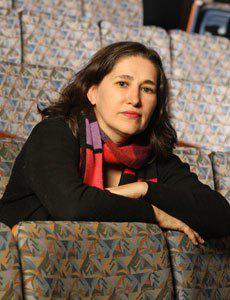
Photo courtesy of Charlotte Meehan.
Another issue I have with the interview question, “Do you think women writers tell different stories than men writers?” is that we are forced to think of gender in a very rigid dichotomy of men and women as polar opposites, not acknowledging that a writer may identify in the middle of the gender spectrum. What would happen to the research if we no longer clumped groups of writers together as either men or women? Would we still be able to gather the statistics of who is getting produced and who is not? What could our reports look like if we were more inclusive of all of gender identities?
From here we enter into an entirely new conflict: when we’re trying to achieve parity, what happens if a writer chooses to reject the label “woman playwright?” Does it affect our definition of gender parity? And if so, how? Statistics have clearly proven that there is a distinguishable gap of writing and production opportunities for women playwrights. As the Kilroys have illustrated, there are too many fantastic plays by women that are either unproduced or have only had one professional production in their stage life. The Top 46 is fascinating to spend time with, because even well-known playwrights such as Paula Vogel can be spotted here. What happens to these initiatives, ones that are educating theatremakers across the United States about the under representation of women playwrights, if one or more writers on the list reject identifying themselves as women playwrights?
And how do other intersections of identity, such as race and ethnicity, factor into our definitions of gender parity? When I asked playwright Migdalia Cruz how she would define gender parity, she answered:
I would be happier with equal amounts of stories by people of color and GBLTQ stories. If those stories were the issue rather than just the gender parity issue, I’d feel I was included in the discussion. I find with these gender issues that white women are the majority and that means no parity for me even at the level of discourse. I identify as a Latina writer and until there is parity based on race/ethnicity there can be no parity for me.
Cruz is pointing out a very real and problematic aspect of the current initiatives for gender parity: most often white women are assuming the leadership positions and guiding the conversation. Therefore, those definitions of gender parity can often reflect racial and ethnic privilege, leaving out the experiences and inequalities of women of color. So, how do we celebrate all our differences in identity and narrative and still define gender parity? In the end, is it even possible for us to come to the same conclusion? For all of us who are discontent, how can we gather our feelings of frustration and unify together?
I would like to be part of a new kind of web, a web of support. Nineteen playwrights spoke out, were caught off guard, reflected, and established a connection about a passion that we share: playwriting.
Here are just a few of the responses these women gave to the question, “What would gender parity in the theatre look like to you?” For every interview, there were many commonalities in sentiment and especially in passion. But every response was also utterly unique, and I am fortunate to have had the opportunity to listen to these women’s voices:
I honestly believe the only way it will ever happen is when male constructs are not used to define what a good playwright is. It’s not about how the playwright presents themselves, it’s about the work. That to me is going to be the first step, because I think we’re putting way too much into how the playwright presents themselves.—Deirdre Girard
I would say 50/50 in terms of if you crunch the numbers across the board for things that are entering our dramatic dialog as a society, but also in terms of where the money is going. I think that’s a really, really important component because it could be 50/50 for everyone except for the big theatres with all the money, but that would not be parity.—Aditi Kapil
The plays that were produced would look like the actual world in a way that it doesn’t right now. The population of the community would be reflected on the stage, in terms of demographics across everything, not just gender.—Annah Feinberg
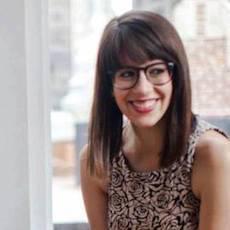
Photo courtesy of Annah Feinberg.
It would look like 50 percent artistic female directorship at the major theatres. It would look like 50 percent women producers on Broadway. It would look like 50 percent of the plays written, included in every season. I was thinking—I had this flight of fancy—I was actually thinking about what would happen to a theatre if they did a season that was exclusively African American writers. How would that change the world? Or exclusively women? It would be so easy…to say, “You know what? Year of the woman. 2016 is the Year of the Woman. Every play we do is going to be written by and directed by a woman.” What’s going to happen, the earth is going to explode? Gender parity means going the other direction.—Melinda Lopez
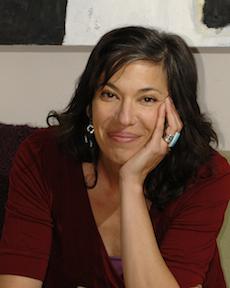
Photo courtesy of Melinda Lopez.
The simplest answer? We wouldn’t have to talk about it. America is totally obsessed with categories. Gender parity, class, race, all the different parities, equalities… We shouldn’t even have to talk about it. That’s the one thing I want. Probably the best thing I could say is: do it—write to the critic. Write your voice, your agency, write your story, write what really moves you whether in a good way or a bad way. Be honest. Go for broke. And gender parity in the theatre—this is one of the delights, but one of the huge problems about theatre—you can’t do it by yourself.—Lynne S. Brandon
Let’s go for broke. Let’s talk and argue, but more importantly, let’s listen. Let’s make room for more voices and their stories. Let’s build our language.
To read the full playwright interviews and learn more about Emma’s research, click here. This research was presented in October 2014 at The Annual Andrew W. Mellon Symposium at Connecticut College, New London, CT.

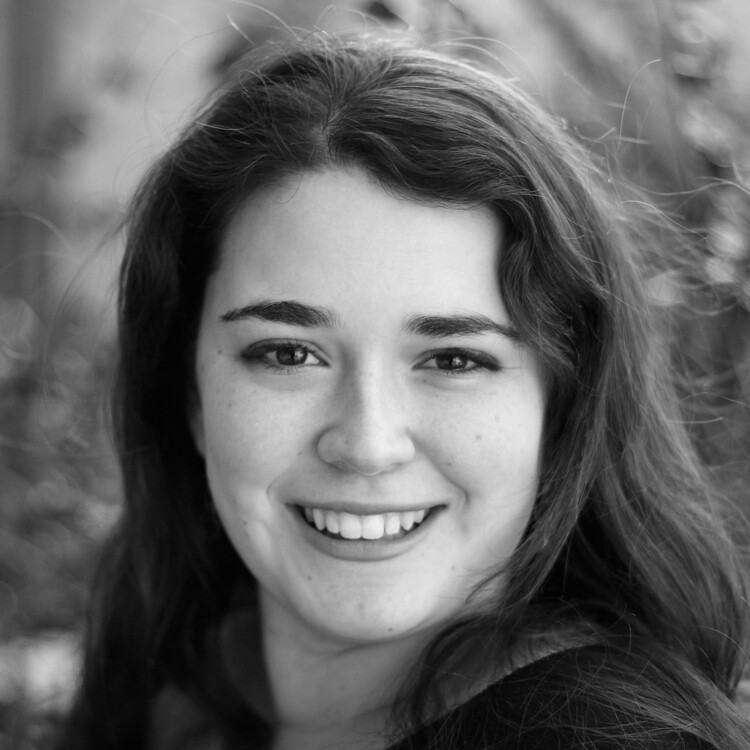
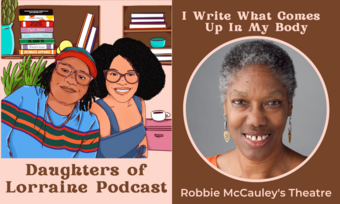


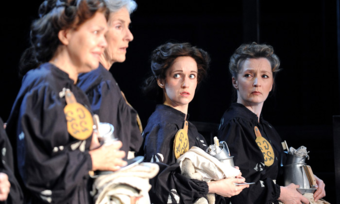

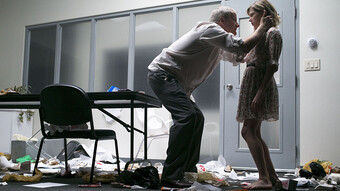

Comments
The article is just the start of the conversation—we want to know what you think about this subject, too! HowlRound is a space for knowledge-sharing, and we welcome spirited, thoughtful, and on-topic dialogue. Find our full comments policy here
Oh man, look at where it says "To read the full playwright interviews and learn more about Emma's research, click here," and then click it. It is so good. You deserve it. You should do it. You will be rewarded with wisdom.
exciting to have this research, these interviews to read and share- thank for this work.